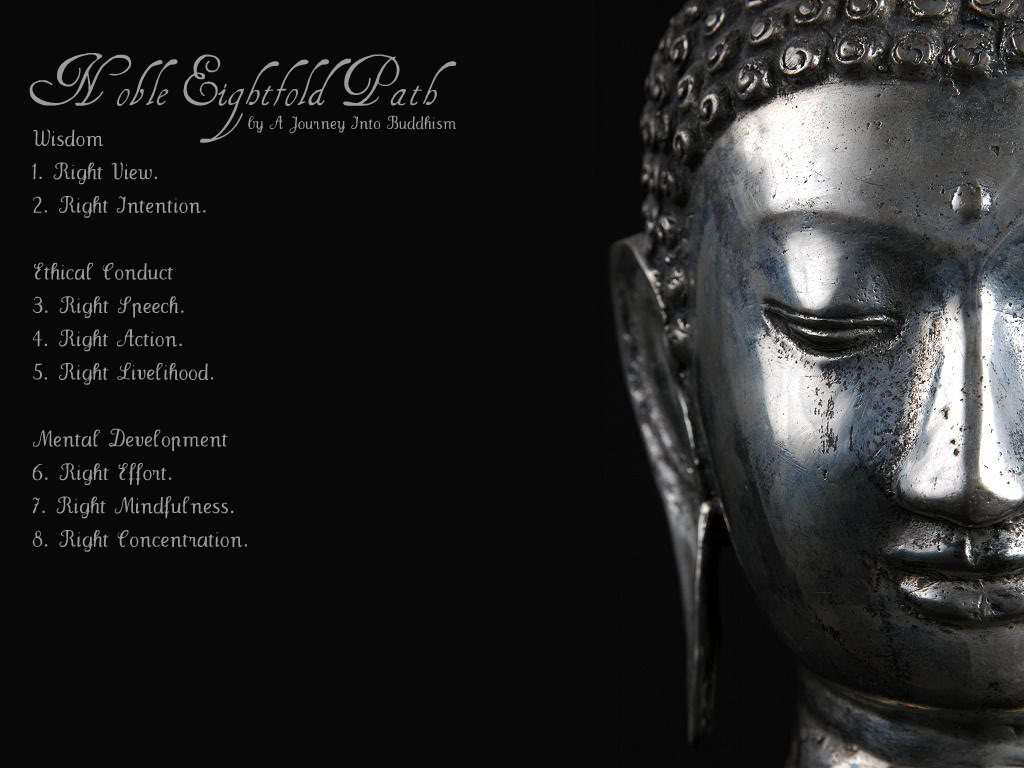Buddha correctly recognized that suffering (duhkha) originates through ignorance and craving, the Noble Eightfold Path is a guide to eliminate ignorance and craving, and by extension, suffering.
The 4th Noble Truth, the Eightfold Path deals with the cultivation of wisdom, moral conduct, and mental discipline.
These Eight guide posts are not commandments, they are vows. For anyone interested in the path to liberation, these ways of life serve to accelerate the process.
The aim of the path is to live a fully balanced life; consider following each part of the Eightfold Path simultaneously, as each step on the path is not meant to be a linear progression.
1. Right View (Wisdom)
Having the wisdom to see things as they really are. Observing and accepting the impermanence of reality and the duhkha (suffering) that is caused by craving for a separate, permanent existence.
2. Right Intention (Wisdom)
Defined simply, it is the intention to act only out of love and compassion. Having a wrong view of reality, where one sees things as separate and permanently enduring causes a person to wrongly grasp for what appears to contribute to their form of identification: a separate/permanent self. The false belief that happiness comes by avoiding what appears to threaten the self.
This way of thinking gives rise to craving, hatred, and violence. Those with right intention instead see the interdependence of all things and processes, correctly identifing that cultivating love and compassion for all beings will bring happiness.
3. Right Speech (Ethical Conduct)
Generally, right speech refers to the avoidance of all talk that will hurt either oneself or others and to speak pleasantly in ways that will help overcome suffering.
It’s negative forms can be interpreted as: lying, slander, character assassination, talk that might bring about hatred, jealousy, enmity, discord, harsh or rude talk, impolite or abusive language, idle or malicious gossip, etc.
It’s positive forms are: telling the truth, speaking in a kindly and friendly way, and using language meaningfully and usefully.
By realizing the time and place for certain language, it implies that at times “noble silence” may be ideal.
4. Right Action (Ethical Conduct)
Based on the idea that no beings have independent existence, then all are dependent upon each other. With this understood, selfishness no longer has any basis.
Negatively, right action can be interpreted as killing, hurting, stealing, cheating, etc.
Positively, it means promoting peace and happiness, and respecting the well-being of all living things.
5. Right Livelihood (Ethical Conduct)
This extends the two former tenets to how one earns a living, prohibiting those careers that bring harm to others. Specifically: drug dealing, using and dealing in weapons, making poisons, killing animals, dealing in prostitution or slavery, etc.
Positively, right livelihood requires that one’s living is earned by means that are honorable, useful, and helpful.
6. Right Effort (Mental Development)
The above developments require discipline, which includes right effort and the two tenets below (right mindfulness & concentration).
Practicing Right Effort includes:
- Preventing evil and unwholesome states of mind from arising,
- Getting rid of evil and unwholesome states of mind that may already exits,
- Bringing about good and wholesome states of mind,
- Developing and perfecting good and wholesome states of mind already present.
7. Right Mindfulness (Mental Development)
Consists in being aware of and attentive to all of one’s activities.
Including:
- Activities of the body,
- Sensing and feeling,
- Perceiving,
- Thinking and consciousness.
This means understanding what these activities are, how they arise, how they disappear, how they are developed, controlled, gotten rid of, and how they are related to each other.
8. Right Concentration (Mental Development)
Refers to a focusing of consciousness that enables one to see deeply into something. Both ignorance and enlightenment, which produce suffering and happiness respectively, have their root in one’s mental activities.
Because one’s mental states determine everything one does, it makes sense to concentrate on purifying one’s mental activities as a means to achieving happiness.
1st Stage:
- Concentrate on getting rid of lust, ill-will, laziness, worry, anxiety, and doubt.
- These unwholesome mental activities are replaced by feelings of joy and happiness.
2nd Stage:
- Concentrate on seeing through and getting beyond all mental activities.
- Retaining an awareness of joy and happiness.
3rd Stage:
- One goes beyond the mental activity responsible for the feeling of joy.
- Achieves an equanimity pervaded by happiness.
4th Stage:
- Complete equanimity and total awareness.
Alan Watts on The Real Eightfold Path
> Source (recommended for further philosophical study)




